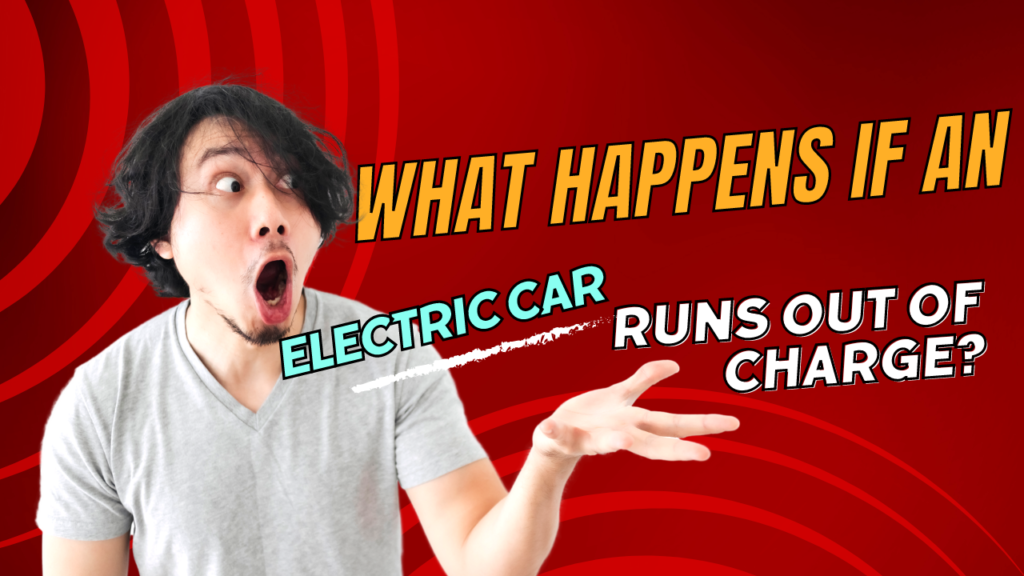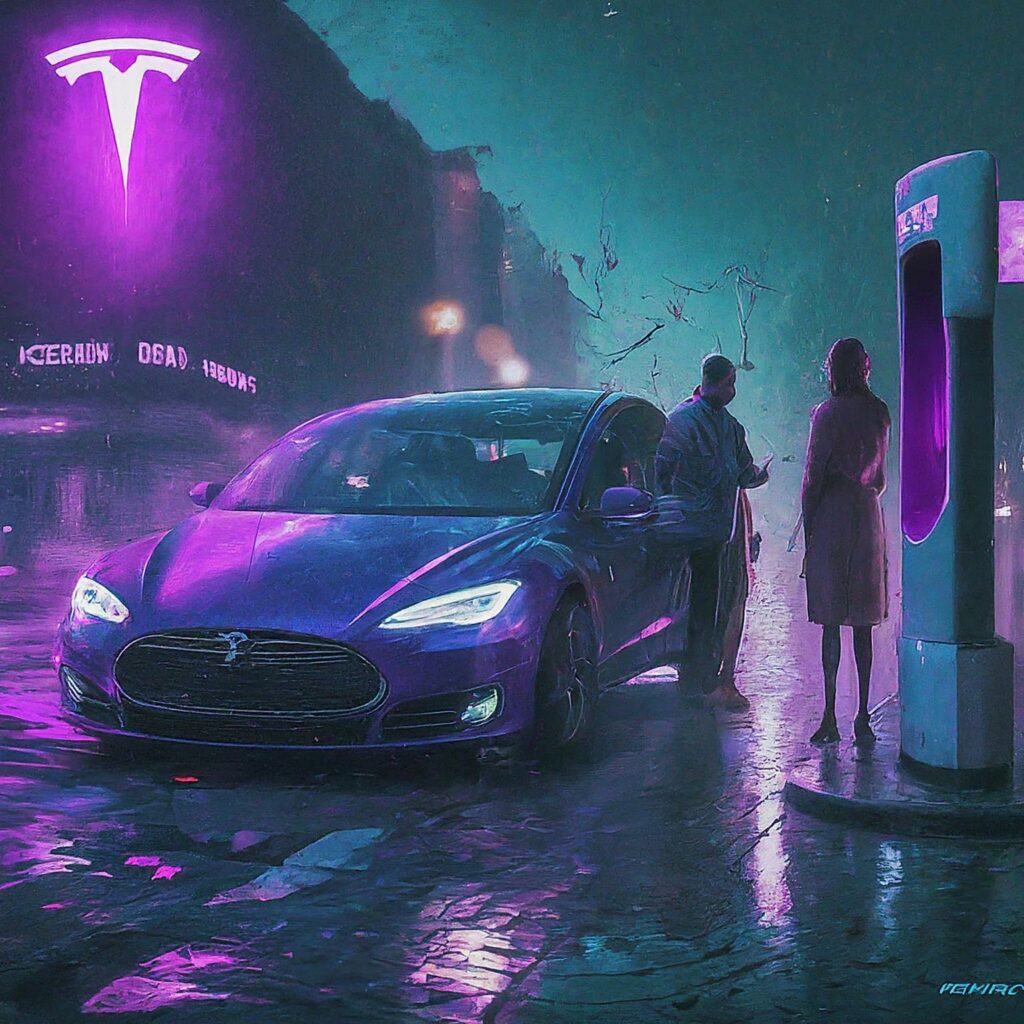
Table of Contents
Introduction
In the constantly changing transportation landscape, electric vehicles (EVs) have become a viable and environmentally responsible substitute for conventional gas-powered automobiles. The practicality of owning an electric car naturally comes up as more people embrace the shift towards electric mobility. One typical worry is,”What happens if an electric car runs out of charge?” We’ll explore the situations and fixes related to an EV running out of charge in this extensive guide.
What happens if an electric car runs out of charge?
Electric cars provide plenty of warnings before they break down, in contrast to gas cars‘ abrupt stops. As the battery runs low, expect reduced power, “turtle mode,” and navigation to nearby chargers. The car will stop at zero, but vital components like the radio and lights continue to function. For a flatbed tow (regular towing can damage the car), call roadside assistance so you can get to a charging station and resume your journey. Recall that the key to completely avoiding this situation is awareness and preparation!

What happens if you run out of energy in a Tesla?
While Teslas constantly alert you when the battery is running low, a full charge necessitates a tow truck. It can’t sputter to a station like gas cars can. You can choose between a flatbed tow and Tesla Roadside Assistance. The low voltage battery may require outside assistance before the main battery can be charged. Fortunately, proactive planning and paying attention to the car’s warnings can completely avoid this circumstance.
Is it okay to charge your car before it runs out of charge?
Yes, without a doubt! Regularly charging your electric car‘s battery before it runs out of juice is not only acceptable, but actually preferable for its health. It is best to frequently charge your battery shallowly (20–80%), as this will lessen the strain on it than if you were to constantly drain and refill it. While occasionally charging to 100% for lengthy journeys is acceptable, try not to make it a routine. Recall that most contemporary EVs have sufficient range for daily commutes, even at 20% charge.

How does a car battery run out of a charge?
Two main ways exist for car batteries to lose charge:
1) Consuming more energy than they absorb: Auto features such as radios and dome lights can gradually deplete the battery even when they are turned off. Short trips also starve the battery because there’s not enough time for the alternator to fully recharge it.
2) Internal or external damage: The battery’s capacity to retain a charge may be weakened by old or defective components, while malfunctioning alternators prevent the battery from charging. Recall that maintaining the system’s capacity to replenish power is just as important as using it.
How far can I go with 10% of the battery on my Tesla?
Tesla has made vehicles with as little as 139, and as many as 405 miles of range at 100%. Obviously, the former would go 13.9 miles on 10%, while the latter would go 40.5 miles… per the EPA and basic math…
Can you push an electric car if it breaks down?
Since most electric cars have a neutral mode that runs on a separate 12-volt battery, you can push one for short distances even if the battery dies. Towing is more difficult, though; avoid towing with the wheels on the ground as this can harm the engine. For safe transport, call a tow truck and let them know it’s an electric vehicle so they can provide a flatbed.
Conclusion: What happens if an electric car runs out of charge?
Although the worry that an electric car may run out of charge is real, the automotive industry is always changing to allay these fears. “What happens if an electric car runs out of charge?”Without sacrificing convenience, electric vehicle enthusiasts can confidently embrace the sustainable future of transportation through technological advancements, the expansion of charging infrastructure, and responsible ownership practices.
FAQs: What happens if an electric car runs out of charge?

Can I still steer and brake if my electric car runs out of charge?
Yes, but only momentarily! The majority of EVs have an additional 12-volt battery that keeps vital components like the brakes and steering running for a while even after the primary battery runs out. But don’t count on this to last forever, so don’t depend on it for too long.
Will I get any warnings before my electric car runs out of charge?
Of course! With their advanced battery management systems, modern EVs can warn you multiple times when the battery is about to discharge. Aural and visual alerts should begin to sound well before the battery runs out of power.
What happens if I completely drain my electric car battery?
All the vehicle will do is stop. There’s no abrupt jerk or sputter from the engine, unlike gas-powered vehicles. It will be safe to stop and you will have a brief window of time to use features like infotainment and lights before they shut down as well.
How far can I drive on “reserve” power after the warnings?
Most EVs provide a few extra miles (5–10) after the low battery alerts to assist you in finding a charging station, though this varies based on the model of the vehicle and the driving conditions. But don’t push your luck!
What if I can’t find a charging station nearby?
Request assistance from a roadside. To give you a quick boost, they can either tow your car to the closest charging station or bring a portable charger. Make sure they know you drive an electric vehicle so they can send a flatbed tow truck.
Can I jump-start an electric car like a gas-powered car?
Not at all! Batteries for electric cars don’t have a starter motor and run on a different kind of energy. Attempting to give it a jump start could harm the electrical system.
How long does it take to recharge an electric car from empty?
The size, kind, and remaining charge of the battery determine how long it will take to charge. While Level 3 DC fast chargers can get you to 80% in as little as 30 minutes, Level 1 chargers, which are found in home outlets, take the longest (8–20 hours).
Are there apps that help me find charging stations?
Indeed! In addition to the third-party apps like PlugShare and ChargePoint, which list nearby charging stations along with their availability and charging speeds, many EV manufacturers have their own apps.
What happens if I run out of charge on a highway?
As soon as you can, pull over to a safe spot—preferably away from the main road. Activate your hazard lights and make a roadside help call. It is not advisable to try pushing the car yourself because it can be dangerously heavy.
Are electric cars more likely to run out of charge than gas cars?
It’s unlikely if you plan ahead and are aware of your car’s range. The majority of EVs have enough range for both extended travel and daily commuting. Furthermore, it is becoming simpler to locate charging stations when on the go due to the ongoing expansion of the charging infrastructure.

Pingback: Is there anything better than electric cars? (10 Questions Answered!) - mandblogs.com